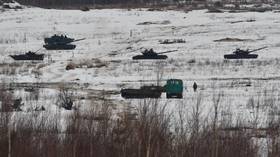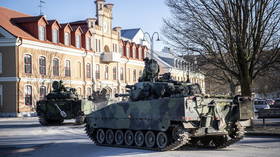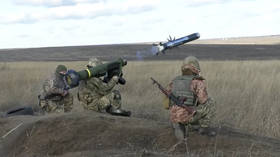Kremlin reveals how it will respond to NATO deployments to Ukraine

Russia believes it would be “madness” to start a war over Ukraine, but doesn’t rule out taking “counter-actions” to NATO deployments if security negotiations fail and its concerns are left unaddressed, the Kremlin has told CNN.
Dmitry Peskov, President Vladimir Putin's long-time spokesman, added that Russia is deeply concerned by a recent spiraling-up of tensions in Europe, in an interview broadcast on Sunday.
“We have too much tension on the border [with Ukraine]. We have too much tension in this part of Europe. It drags [in] more problems automatically. It is extremely dangerous for our continent,” he told the host of the ‘Fareed Zakaria GPS’ show.
According to Peskov, the only way forward for the US and NATO is to finally address Russia’s concerns in earnest, instead of brushing them off. “This is the reason we are insisting on receiving a direct response,” he explained, adding that Moscow expected an “extremely specific” response to its “extremely specific proposals.”
Moscow is not issuing any ultimatums, he maintained, adding that the Kremlin was not “speaking about military action,” and considers a military scenario “madness to do that.” However, he suggested Moscow would respond to the continued NATO expansions in other ways.
We will be ready to take counter-actions. If you continue to say, ‘listen, Russians, we’re not going to take into account your concerns. NATO will continue to expand. Now we’re not going to have Ukraine [joining] NATO, but with time, legally, it will be possible. We’re not going to say that we will not deploy any offensive weapons on Ukraine’s territory, and NATO’s military infrastructure will stay next to your border and will, with time, get even closer.’ If you tell us that, we will have to do something.
Since late 2021, Ukraine and the US have insisted that Russia has been amassing military personnel near the Ukrainian border, and have claimed that this is evidence it is preparing for an invasion. Moscow has repeatedly denied such plans.
In December, Russia issued a set of proposals for improving collective security, which included guarantees that NATO would not expand further east and a particular agreement that no post-Soviet state, including Ukraine, should be permitted to join it.
These demands were rejected by the US and its allies during a week of high-level talks between officials from Russia, the US, NATO, and the Organization for Security and Co-operation in Europe. Former NATO secretary general Anders Fogh Rasmussen even threatened that the bloc could absorb Finland and Sweden “overnight,” should they be “provoked” into considering such a possibility by Moscow.
Following the talks, which Peskov described as “unsuccessful,” the US continued to allege that Russia was preparing false flag operations in Ukraine to spark a full-blown conflict. The spokesman denied that anything of the sort was taking place. “You can see that this is not happening,” he said. He brushed off all such accusations, dismissing US National Security Advisor Jake Sullivan’s allegations as “fake news.”
“He [Sullivan] promised to publish the proof of these accusations within 24 hours [yesterday] … we are still waiting for that proof,” Peskov said, adding that “until it is proven somehow … we will continue to presume that it’s fake news.”
Russia is still seeking de-escalation, and is concerned by the fact that Moscow and Washington are on what Peskov called “totally different tracks” – a situation he described as “disturbing.”














